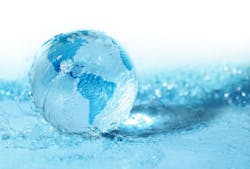Ion exchange resins are useful for the removal of water problems including hard water, scale buildup, nitrates, arsenic and more. The articles below explain proven treatment methods and how ion exchange can be an important, cost-effective solution.
Build profits with light commercial arsenic removal — A challenging contaminant to remove from water systems, arsenic can be effectively attacked with ion exchange. Richard Sinclair of Applied Process Equipment Inc. discussed how arsenic removal presents a profitable opportunity for business owners. While ion exchange can be effective in this scenario, it may not always be the most practical or cost-effective. Sinclair presents alternative methods to build ensure lucrativeness.
Addressing hard water and scale with sustainable solutions — Scale buildup can have many negative effects on water pipes, and hard water can make washing clothes, dishes, fixtures and people difficult. Softening water remedies these problems, and the ion exchange method is one of the most common water softeners. Salt is added to recharge the system to keep it operating properly.
Follow the chemistry line of logic — When regenerating resin, it is important to know how much salt it takes to do so. Adding too much salt can mean wasted salt, which wastes more water. While no system produces 100 percent exchange of the salt with the resin, understanding how ion exchange softener systems can help system designers be as efficient as possible. Better designed systems can lead to less waste, less chloride loading in sewers and an improved industry reputation.
Removing nitrates with ion exchange — Ion exchange resins can remove dangerous nitrates from drinking water. Nitrates have no taste or smell and can cause "blue baby syndrome" in infants because they interfere with how oxygen travels in a baby’s bloodstream. The two most commonly used nitrate-selective resins that have been synthesized are tributylamine and trimethylamine. This article explains treatment methods and relative affinity for common ions.
The ABCs of ion exchange resin cleaning — Improved water quality and the preventive maintenance are two benefits of ion exchange systems. Two primary concerns with water softeners are the tendency to become fouled with iron and manganese or by organics such as tannin or humic acids. Several cleaning methods exist including a sodium hydrosulfite procedure, resin cleaners that can be added to the brine solution and a method specifically for organically fouled cation resins.
Certification Action Line: Ion and cation exchange resins — Questions about ion exchange and resin appear on certification examinations. In partnership with the Water Quality Association, we carry a monthly column featuring examples of questions professionals can expect to find on these tests.
